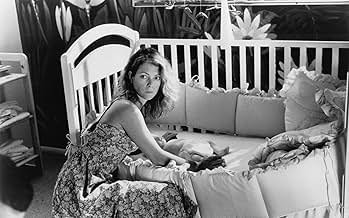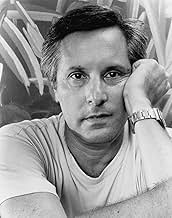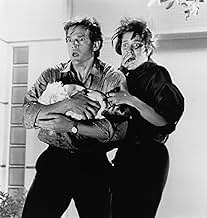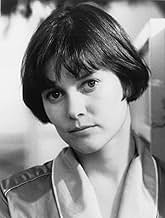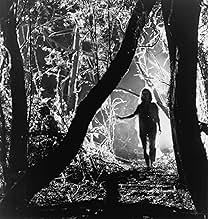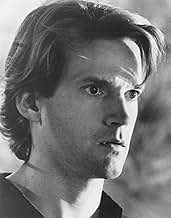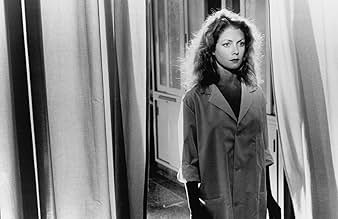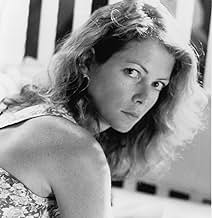IMDb RATING
5.4/10
6.6K
YOUR RATING
Young married couple Phillip and Kate Sterling, who have a newborn son named Jake, don't realize that their new nanny Camilla is a magical Druid who sacrifices infants to an evil tree.Young married couple Phillip and Kate Sterling, who have a newborn son named Jake, don't realize that their new nanny Camilla is a magical Druid who sacrifices infants to an evil tree.Young married couple Phillip and Kate Sterling, who have a newborn son named Jake, don't realize that their new nanny Camilla is a magical Druid who sacrifices infants to an evil tree.
- Awards
- 3 nominations
Natalija Nogulich
- Molly Sheridan
- (as Natalia Nogulich)
Barry Herman
- Dr. at Birth
- (as Dr. Barry Herman)
Storyline
Did you know
- TriviaJenny Seagrove was unhappy with the film's constant re-writes, and wanted to make a completely different film. She said to The Guardian in 2007: "It was about this druid nanny who became a tree. I begged Universal to make it about a real nanny who kidnaps babies. 'No, no, we can't do that,' they said, 'the thirty somethings in America won't come and see the film.' I said, 'I think you're completely wrong; this film is total fantasy, and it's just awful.' Two years later The Hand That Rocks the Cradle (1992) was released, so I rang up my friend at Universal and he said, 'Don't. Don't even talk about it, you were right.' "
- GoofsAs the tree is being cut down, the movie keeps cutting back to Camilla, showing what damage it is doing to her. When the guy finishes cutting down the tree, there is a shot of Camilla and her left leg breaks off and she falls to the ground. The two shots immediately following, of the mother tackling her and then of Camilla being thrown out the window, both show her with her legs still intact.
- Quotes
Phil Sterling: You take your hands off my baby!
- Alternate versionsThere are two versions of "The Guardian": the theatrical cut, credited to William Friedkin, and a modified cut, credited to "Alan Smithee". The Alan Smithee cut has never been released on video but has been shown on cable. It includes new scenes including another scene in the hospital; different dream sequences; a scene of the nanny waking the wife up and alternate angles for other scenes. Also, the ending of the cable cut is different and omits much of the gore.
- ConnectionsFeatured in Siskel & Ebert: Miami Blues/Vital Signs/Lisa/Chattahoochee (1990)
- SoundtracksPalau
Music by Not Drowning Waving (as Not Drowning, Waving)
Lyrics by David Bridie
Performed by Not Drowning Waving (as Not Drowning, Waving)
Courtesy of Mighty Boy Records
Featured review
"The Guardian" was one of those films that passed through the hands for several directors (including Sam Raimi, who left to direct, "Darkman") and writers, before veteran William Friedkin came aboard, more as a 'director for hire' (think George Pan Cosmatos or Jack Lee Thompson in the 80's / early 90's) than an 'auteur'.
Friedkin was hired in the hopes that his masterpiece "The Exorcist" ('73) helped in the promotion of "The Guardian" as Friedkin's second entrance into the horror genre and after the box office failures of his two previous films, the stylish and vastly underrated, "To Live and Die in L.A." ('85) and "Rampage" ('87), the director needed a sure thing hit to re-establish himself for the 90's crowd.
Maybe "The Guardian" wasn't exactly the right project, because even if Friedkin did some rewrites to the shooting script, when something is a mess to begin it, even a mad genius can't do miracles.
The movie is about some druid nanny that kidnaps 4 weeks old babies to fed them to a huge tree in a dark forest, and the formulaic plot follows a young couple with a new born male baby that in the end will stop the nanny's obscure activities.
"The Guardian" is stylish directed and photographed, presenting peculiar camera angles and polished visuals, unfortunately the editing is a mess, the script is lousy and some scenes are so ridiculously staged that defies any sense of logic that looked like the movie was directed by a number of different directors, each one with a different view on the film's overall mood and atmosphere.
Some scenes are pure Friedkin's visual fanfare, like the beginning with the owl and showing the nanny with the previous family or the wolfs' siege at the architect house, grim, dark and moody with the mastered touch of creating the sense of dread upon the viewer, in other scenes looked like it was directed by some B-filmmaker trying to poorly mimmick Sam Raimi's "Evil Dead" franchise, with badly staged sequences, like the three burglars in the park that got slaughtered by the huge tree, that were even worse acted, photographed and delivered.
In terms of performances, the english beauty Jenny Seagrove, from "Woman of Substance" ('85) fame, is very good in the role of the dark nanny, Camilla Grandier, she's expressive, seductive and charming in her evilness and she can act well with her dazzling blue eyes, leaving a strong mark into the plethora of horror movies villains. Like she herself said, and this reviewer agreed, she deserved a much better written film.
I don't know why, maybe due to the limited budget, William Friedkin gave the co-leading role of Phil Sterling, the baby's dad, to his stock character actor, Dwier Brown, when his more relevant role was playing Kevin Costner's dad in the flashback scenes of previous year's, "Field of Dreams" ('89). Brown sports a dumb face for the most part of the film and his reactions to Seagrove's acting is like seeing a rookie trying to upstage a veteran and failing miserably.
Former Bond girl in "License to Kill" ('89), hottie Carey Lowell fares better in an underused role of the mom and Miguel Ferrer is as essential to the plot as an umbrella in a sunny day. Brad Hall as Ned Runcie, the architect, who resembled a lot Woody Harrelson back in the day, shines in one of the best scenes in the film, the aforementioned wolfs' siege.
The big finale is the cherry on the top of the cake in terms of its ridiculousness. Suddenly the movie stops being subtle and went all "Evil Dead 2" rip-off with Dwier Brown dressing a blue shirt, same hairstyle and with a chainsaw fighting a tree, roaring and screaming with blood oozing to his face and gore everywhere. It's so Bruce Campbell versus Evil Dead, that Friedkin should have been ashamed of directing such a blatant carbon copy.
In short, "The Guardian" tried to be a realistic thriller / suspense film about a nanny kidnapping babies and a modern dark fantasy fairytale at the same time, somewhere beetween that and the constant rewrites and Friedkin's lack of heart in the project, the movie was lost for the worse. It didn't worked. Two years later, Curtis Hanson handled this plot better, minus the druids' non-sense, and directed "The Hand That Rocks the Cradle" ('92), which was a huge critically and box office success.
I give it a 5.5, increasing to 6 here, due to Friedkin's visual elegance and some interesting camera angles.
Friedkin was hired in the hopes that his masterpiece "The Exorcist" ('73) helped in the promotion of "The Guardian" as Friedkin's second entrance into the horror genre and after the box office failures of his two previous films, the stylish and vastly underrated, "To Live and Die in L.A." ('85) and "Rampage" ('87), the director needed a sure thing hit to re-establish himself for the 90's crowd.
Maybe "The Guardian" wasn't exactly the right project, because even if Friedkin did some rewrites to the shooting script, when something is a mess to begin it, even a mad genius can't do miracles.
The movie is about some druid nanny that kidnaps 4 weeks old babies to fed them to a huge tree in a dark forest, and the formulaic plot follows a young couple with a new born male baby that in the end will stop the nanny's obscure activities.
"The Guardian" is stylish directed and photographed, presenting peculiar camera angles and polished visuals, unfortunately the editing is a mess, the script is lousy and some scenes are so ridiculously staged that defies any sense of logic that looked like the movie was directed by a number of different directors, each one with a different view on the film's overall mood and atmosphere.
Some scenes are pure Friedkin's visual fanfare, like the beginning with the owl and showing the nanny with the previous family or the wolfs' siege at the architect house, grim, dark and moody with the mastered touch of creating the sense of dread upon the viewer, in other scenes looked like it was directed by some B-filmmaker trying to poorly mimmick Sam Raimi's "Evil Dead" franchise, with badly staged sequences, like the three burglars in the park that got slaughtered by the huge tree, that were even worse acted, photographed and delivered.
In terms of performances, the english beauty Jenny Seagrove, from "Woman of Substance" ('85) fame, is very good in the role of the dark nanny, Camilla Grandier, she's expressive, seductive and charming in her evilness and she can act well with her dazzling blue eyes, leaving a strong mark into the plethora of horror movies villains. Like she herself said, and this reviewer agreed, she deserved a much better written film.
I don't know why, maybe due to the limited budget, William Friedkin gave the co-leading role of Phil Sterling, the baby's dad, to his stock character actor, Dwier Brown, when his more relevant role was playing Kevin Costner's dad in the flashback scenes of previous year's, "Field of Dreams" ('89). Brown sports a dumb face for the most part of the film and his reactions to Seagrove's acting is like seeing a rookie trying to upstage a veteran and failing miserably.
Former Bond girl in "License to Kill" ('89), hottie Carey Lowell fares better in an underused role of the mom and Miguel Ferrer is as essential to the plot as an umbrella in a sunny day. Brad Hall as Ned Runcie, the architect, who resembled a lot Woody Harrelson back in the day, shines in one of the best scenes in the film, the aforementioned wolfs' siege.
The big finale is the cherry on the top of the cake in terms of its ridiculousness. Suddenly the movie stops being subtle and went all "Evil Dead 2" rip-off with Dwier Brown dressing a blue shirt, same hairstyle and with a chainsaw fighting a tree, roaring and screaming with blood oozing to his face and gore everywhere. It's so Bruce Campbell versus Evil Dead, that Friedkin should have been ashamed of directing such a blatant carbon copy.
In short, "The Guardian" tried to be a realistic thriller / suspense film about a nanny kidnapping babies and a modern dark fantasy fairytale at the same time, somewhere beetween that and the constant rewrites and Friedkin's lack of heart in the project, the movie was lost for the worse. It didn't worked. Two years later, Curtis Hanson handled this plot better, minus the druids' non-sense, and directed "The Hand That Rocks the Cradle" ('92), which was a huge critically and box office success.
I give it a 5.5, increasing to 6 here, due to Friedkin's visual elegance and some interesting camera angles.
- DeuceWild_77
- Apr 8, 2020
- Permalink
- How long is The Guardian?Powered by Alexa
Details
Box office
- Gross US & Canada
- $17,037,887
- Opening weekend US & Canada
- $5,565,620
- Apr 29, 1990
- Gross worldwide
- $17,037,887
Contribute to this page
Suggest an edit or add missing content








